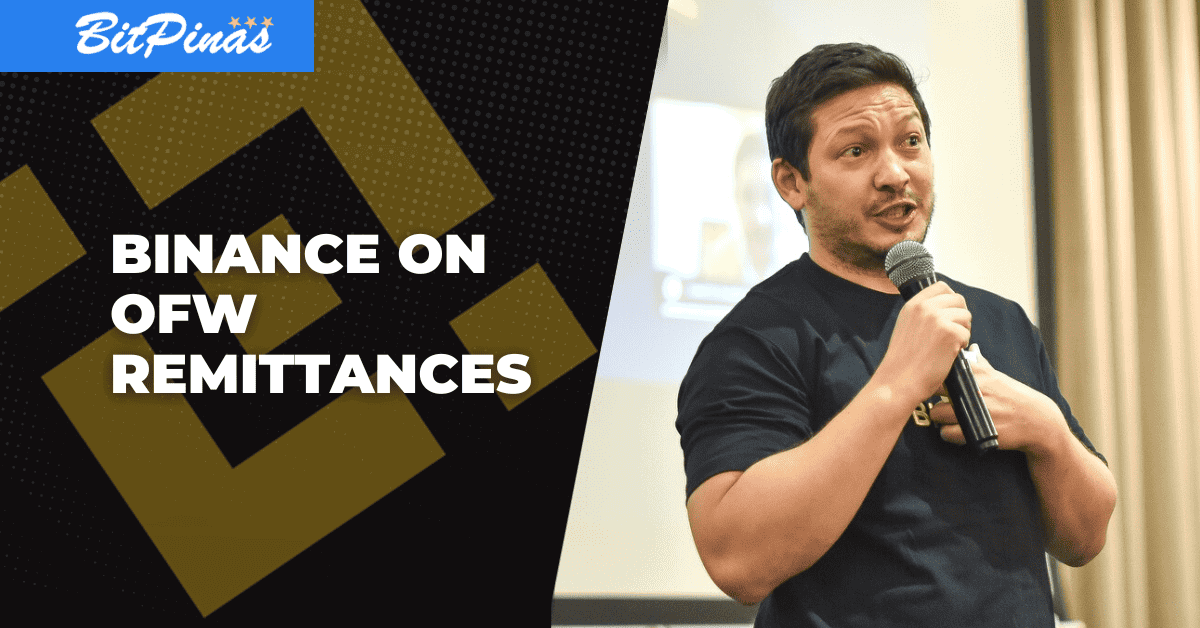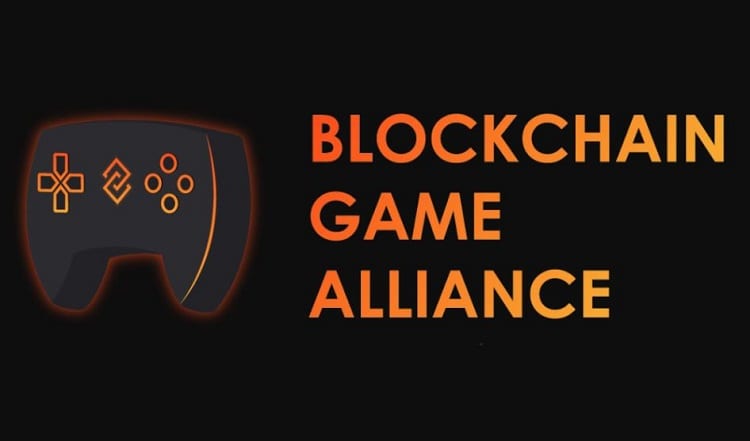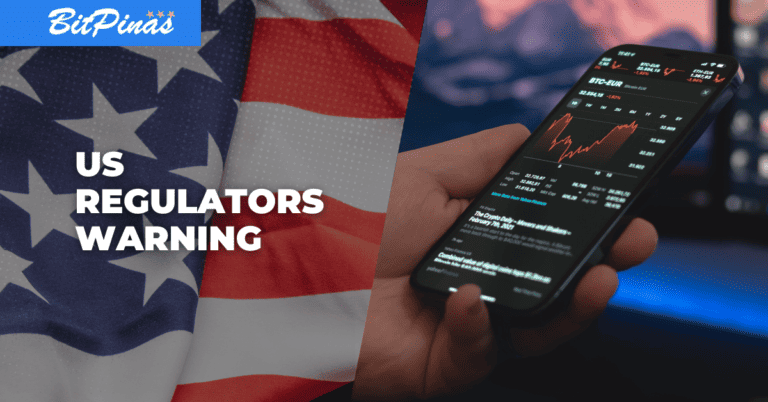Binance Philippines Chief on How Blockchain Can Make OFW Remittances Faster and Cheaper
Binance Philippines’ Kenneth Stern counts the ways in which blockchain can help OFWs send their money faster and cheaper back to the country.

Subscribe to our newsletter!
Editing and Additional Reporting by Nathaniel Cajuday
The Philippines, being a developing third-world country, still has Overseas Filipino Workers (OFWs) and their remittances as its biggest economic asset. In fact, the data from the Philippine Statistics Authority (PSA) showed that as of last year, OFW remittances hit a record-breaking $34 billion, which accounted for 8.9 percent of the country’s GDP.
However, the process of transferring the hard-earned money of OFWs to the country has become outdated and still costly amid technological advancements.
To ease this process, Kenneth Stern, the General Manager of the Philippine arm of cryptocurrency exchange Binance, suggested that blockchain technology might be the answer, as remittances are one of the most common ways for OFWs and other financial technology users to send money and transact globally.
The exchange stated that its aim is to “use blockchain technology to further the freedom of money not just in the Philippines but also around the world.”
Remittance through Blockchain via Cryptocurrency
Accordingly, Stern noted that as per his own experience of how hard the whole process was when his mother is an OFW nurse in the USA, what they had to endure just to send money from abroad, such as transfer difficulties and delays, and the varying transaction fees. He also stressed the lack of transparency that would sometimes lead to OFWs opting for faster but riskier options.
“Traditional remittance is costly and time-consuming but, at least back in the day, there was no other good option other than channels such as Money Transfer Operators or MTOs. MTOs are non-bank financial institutions that send funds cross-border, either within their own system or via partnerships with a network of banks. Costs for sending money through MTOs are expensive and complex,” the Binance PH Head stressed, emphasizing what OFWs had to go through just to send money. MTO rates and fees are often more or less 20% of the amount to be transferred.
Aside from the costly fees, intermediaries or other institutions involved in the transfer, such as the MTO’s partner banks and agents, can also make the process complicated and slow. The availability of these institutions is also limited most of the time, and they are inaccessible in remote locations.
To ease sending funds all over the globe, Stern says that the answer might be obvious – “remittances in cryptocurrency,” explaining that blockchain technology could be the optimal approach compared to MTOs and other traditional funds or money transfers.
According to him, cryptocurrencies are digital assets that users can store or hold in a digital wallet, either on their own custody wallets or via exchanges. Users also have the liberty to access these assets anytime and anywhere—as long as they have an internet connection.
“Using cryptocurrency’s underlying blockchain technology, funds can be transferred seamlessly using peer-to-peer methods meaning that the transfers are direct from one wallet to another. Faster transactions will also be the norm as crypto fund transfers happen nearly instantaneously with less worry regarding intermediaries complicating the process. One such example is Binance Pay, Binance’s own contactless, borderless, and secure cryptocurrency payment technology. Binance Pay allows users to pay, spend, and — importantly for remittances — send funds in the form of cryptocurrency to each other anywhere in the world. And the best part is? There are no fees involved,” the executive emphasized.
To address the volatility counterargument against crypto, Stern clarified that users can process their funds through stablecoins–such as BUSD or the Binance USD–whose value is always equivalent to the US Dollar. (Read more: Legal and Regulatory Aspects of Stablecoins by Atty. Rafael Padilla)
In September, Director Mhel Plabasan of the Bangko Sentral ng Pilipinas (BSP) disclosed that the central bank sees stablecoins as a plausible solution for more efficient payment transactions in the country. (Read more: BSP Director: Stablecoins Can Make Payments More Efficient)
Adoption is Key
To make this proposal come to life, as cryptocurrency is still not widely known to most Filipinos, Sterns highlighted that adoption will play a big part in solving this issue over time. The help and support of businesses utilizing blockchain and crypto technology will also play a role.
“The Philippines is a massive remittance market, with remittance inflows accounting for 9% of the national GDP. Digital assets, especially stablecoins, will help bridge the gap for recipients who don’t have access to traditional banking, and where money transfer services charge high fees,” they wrote in a statement.
Citing the data from Binance, users can save up to 8% in fees when sending funds using cryptocurrency compared to traditional money transfer methods. By using crypto, some of the most vulnerable populations and countries in the world would benefit and avoid unfair and inefficient deadweight costs for transferring small amounts of money across borders.
Accordingly, with the proposed new way, the UN estimates that using digital payments for remittances could increase the money received by users by 3-5%, potentially lifting 30 million people out of poverty on a global scale.
According to Chainalysis’ annual index report titled, “The 2022 Global Crypto Adoption Index” published last September, the Philippines ranked second among the 20 countries surveyed in terms of crypto adoption. In May, the country also ranked second in terms of ownership of cryptocurrency according to the GWI 2021 Q4 broad global survey, which revealed that 22.7% of Filipino respondents stated that they own and use crypto. (Read more: PH Ranks 2nd in Chainalysis Crypto Adoption Report)
Digital Future in the Philippines
The Binance Philippines Head strongly believes that by enabling access to digital wallets and offering digital finance solutions, the “crypto industry can greatly benefit the Filipino people by addressing the necessity of financial inclusion through digitalization.”
Further, he noted that digital wallets can create a gateway into digital assets, and cryptocurrency, which will further the freedom of money and will allow more Filipinos an opportunity to experience world-class financial products.
Consequently, Binance is reaching out to the Department of Migrant Workers (DMW) to propose a partnership on a global study of OFW needs, and it can fund remittances to and from OFWs and provide assistance to OFWs in distress to further support this idea.
Stern also declared that “in the next few years it’s going to be interesting to see what this technology can bring and what impact it can make on the Philippines”.
In a panel discussion during the Global Blockchain Summit held last month, Stern stated that to further the adoption of blockchain in the country, Binance will focus on three aspects— education, law enforcement trading, and government support. (Read more: Coins.ph, Binance, Maya Highlights Efforts in Digital Asset Adoption in PH)
Stern was also among the local web3 industry leaders that signed the solidarity statement pledging to further improve blockchain adoption in the Philippines. (Read more: Local Web3 Leaders Answers Gov’t Call with Solidarity Statement)
This article is published on BitPinas: Binance PH Chief Says Blockchain Will Help Ease OFW Remittance
Disclaimer: BitPinas articles and its external content are not financial advice. The team serves to deliver independent, unbiased news to provide information for Philippine-crypto and beyond.





